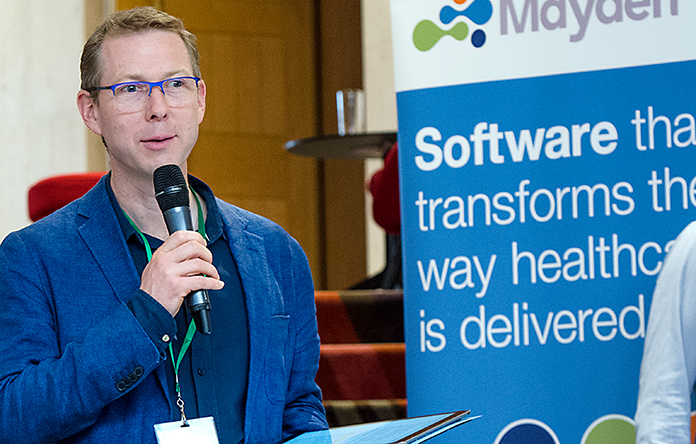
Thanks to all who joined us at IAPT Connect 2017. We’re pleased to be able to share slides from each of our speakers’ presentations.
Check back for blogs recapping the presentations over the coming weeks. Make sure you don’t miss a thing by signing up to receive our enewsletter.
- Morning sessions: Adult services
- Morning sessions: CYP services
- Afternoon sessions: Adult and CYP services
Morning sessions: Adult services
National update
Ursula James, IAPT Programme Manager, NHS England
What are the next steps for IAPT? Ursula’s talk provides an update on progress with Five Year Forward View commitments including the long term condition pilots and payment by results.
Digital therapies and IAPT
James Woollard, Senior Clinical Fellow, NHS England
Digital therapies and mental health apps are now being widely adopted by IAPT services, but what is the next step? James asks questions to make us consider the future of digital treatment and support.
Who looks after our therapists?
Judith Chapman, Clinical Director, Berkshire Talking Therapies
Our therapists are focused and dedicated to look after their clients. But who looks after them? How does a team effectively care for the individuals that deliver therapy? Are you working in such a team?
Understanding and coping with PTSD – preparing for treatment group
Cat Gercs, Lead Assistant Psychologist and Anthony Helm, CBT Therapist, Milton Keynes IAPT
Milton Keynes IAPT service has implemented a four week rolling course which offers evidence based techniques to help people start to reclaim their lives and manage their symptoms whilst on a waiting list for high intensity CBT. Cat and Anthony share details of why they started the group and the outcomes so far.
Integrating with physical health services and doing home visits – a way to access the hard to reach with long term conditions?
Dr Chris Allen, Consultant Clinical Psychologist, Berkshire Healthcare NHS Trust
People with multiple long term conditions who become housebound can be difficult to reach via traditional IAPT or mental health services. In East Berkshire, Psychological Interventions in Nursing and Community Services (PINC) have been integrated into community nursing teams to offer a home visit service providing transdiagnostic cognitive behaviour therapy.
Australia takes the plunge
Bronwyn Hall, Head of NewAccess, beyondblue
Australian organisation, beyondblue on NewAccess: a tailored IAPT programme for the Australian context, and their success in engaging hard to reach groups and overcoming the barriers that prevent people from seeking support.
Morning sessions: CYP services
National update on children and young people’s mental health
Sally Milne Project Manager, CYPMH Clinical Strategy and Policy Team, NHS England
Sally presented an update on national policy for improving children and young people’s mental health support, including the CYP IAPT programme, and progress towards commitments as shown by national data collections.
Advances in care at Cheshire and Wirral Partnership NHS Foundation Trust: implementing THRIVE principles and digital resources
Mark Bunnell CYP IAPT Transformational Lead and Adele Hurst Associate Trainer, Next Steps, Cheshire and Wirral Partnership NHS Foundation Trust
Mark and Adele talked about CWP’s implementation of THRIVE principles and the development of coproduced digital resources for children and young people, including the award winning MyMind CAMHS website, MyWellbeing online support service and Next Step Card online resources.
Digitally enabled pathways in children and young people’s mental health care
James Woollard, Senior Clinical Fellow, NHS England
James explored how technology can play an important role in transforming care in CYP mental health, and how it can help embed the collaborative and patient centred approaches that services can deliver when they’re at their best.
The meaningful use of routine outcome monitoring for children and young people with anxiety and depression
Polly Waite, Clinical Psychologist and Clinical Director, Anxiety and Depression in Young People Research Clinic
This presentation considered the meaningful use of routine outcome monitoring (ROMs) within a low intensity treatment service for children and young people with anxiety and depression. It also explored the evidence base for the use of ROMs and how Berkshire uses ROMs within both sessions and supervision to guide treatment.
Improving access to early intervention: wellbeing practitioners for CYPMH
Jonathan Parker Clinical Lead, CYP IAPT South West Learning Collaborative, University of Exeter
Jonathan explored the challenges and opportunities of implementing new wellbeing practitioners for children and young people within community teams and provided an insight into the training programme that the CYP IAPT Learning Collaborative is leading for providers in the South West.
Afternoon sessions: Adult and CYP services
Recovery College and digital platforms: supporting community wellbeing
Claire Webb, cCBT Coordinator and Renée Hepker, Recovery College Lead, Inclusion Thurrock
Claire and Renée shared their experiences of establishing digital platforms and Thurrock Recovery College, located within their IAPT service, including how every aspect of the service is coproduced with people with lived experience, how peer mentors play a key role, and how digital platforms and online therapies support the service. They also shared how the Recovery College is being extended to younger people.
Changing your MINDSet: coproduction and quality improvement in mental health
Anna Burhouse, Director of Quality Development, Northumbria Healthcare NHS Foundation Trust and Consultant Child and Adolescent Psychotherapist, 2gether NHS Foundation Trust
Anna presented how to use creative quality improvement and coproduction techniques in mental health services and the impact they can have on outcomes. Anna signposted free resources and accessible tools, online training opportunities, and highlights how to share your work with others through a national community of practice.
Behavioural insights for mental health
Edward Flahavan, Associate Research Advisor Behavioural Insights Team and Victoria Fussey Advisor, Behavioural Insights Team
The Behavioural Insights Team (BIT) presented how their work has helped across a broad range of policy areas – including healthcare. Edward and Victoria also shared details of two studies across mental health services that will explore the impact of behavioural insights on DNAs and client engagement.
Panel: How can we better support young people’s transition from CYP to adult services?
Chair: Nicky Runeckles Panel: Anna Burhouse, James Woollard, Val Clark, Morad Margoum, Ursula James
Moving between services is stressful for young people and they are expected to become independant service users at a time when they are already feeling vulnerable. Our panel explored the challenges and discuss ideas with the audience on how we can improve transitions.
Tomorrow’s mental healthcare: how IT can make the difference
Chris May, Managing Director, Mayden
Chris explored the challenges that mental health services are facing, and the future role that IT can play in helping create sustainable and efficient mental healthcare systems; from streamlining admin and communications, to artificial intelligence and the delivery of treatment online that can help tackle the growing demand for mental health support.

